
Backroads Around Las Vegas, Spring Mountains (Mt. Charleston)

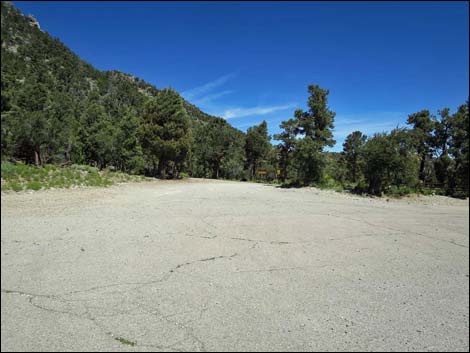 Macks Canyon Road (view N from Lee Canyon Road) |
Overview Macks Canyon Road (aka: Mack's Canyon Road) is a 4-mile, graded, one-lane dirt road that winds and twists its way across the side of the mountains and up into Macks Canyon. Parts of the road are narrow, parts are steep, and parts provide grand views off to the north. Most of the road runs in the woods, and the road ends in a park-like stand of Ponderosa Pine mixed with White Fir. The road provides access to numerous primitive camping areas, Macks Canyon Group Camp (zero facilities unless you consider fire rings), a spring with nice birdwatching, and Macks Canyon Trailhead. Link to map. |
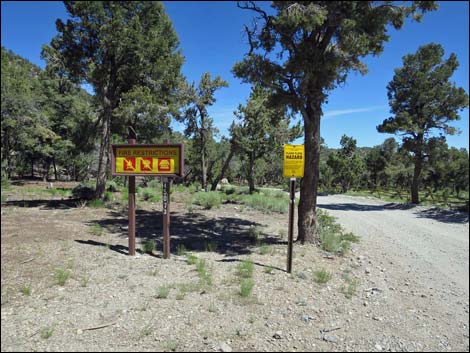 Start of Macks Canyon Road (view N) |
Watch Out Other than the standard warnings about being in the desert, ...this is a fairly safe drive, but the road is narrow and steep in places, and it can be washed out or wash-boarded (which can make the steep parts nearly 4WD). Under good conditions, the road is suitable for a carefully driven sedan, but gashes on trees along the way suggest that people with RVs and trailers might want to go elsewhere. While out, please respect the land and the other people out there, and try to Leave No Trace of your passage. Also, even though this road is short, be sure to bring what you need of the 10 Essentials. During times of high fire danger, open wood fires and charcoal are prohibited. Always be careful with fire in this wooded area. |
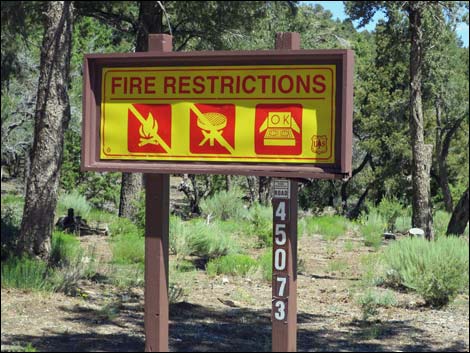 Macks Canyon Road -- USFS Road 45073 |
Getting to the Roadhead This road is located off Lee Canyon Road (Highway 156) about 45 minutes northwest of Las Vegas. From town, drive north on Highway 95. From the outskirts of town, drive north about 14 miles to Lee Canyon Road, on the left. Turn left onto Lee Canyon Road and drive southwest on the paved road 13.4 miles to Macks Canyon Road, on the right. There is no street name sign, but this is the first right turn past Sawmill Picnic Area, and a sign along Lee Canyon Road reads "Macks Canyon Group Camps 4 Miles" with an arrow to the right. The paved apron at the turnoff is quite large. Signs sit off at the edge of the trees, barely visible from Lee Canyon Road, with the road number marked on a sign post: 45073. |
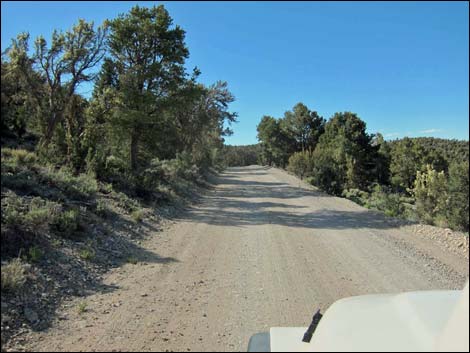 Macks Canyon Road (view N) |
The Road From Lee Canyon Road (Table 1, Site 0729), Macks Canyon Road runs north-northwest through the woods while contouring across the side of the mountain. Primitive campsites can be seen back in the trees on both sides of the road not far off the pavement. In this area, the forest is a Pinyon-Juniper Woodland. Here, short trees (single-leaf pinyon pine and Utah juniper) grow among dense thickets of mountain mahogany and other shrubs. A few tall ponderosa pine grow in this area, but most are farther up the road at higher elevations. At about 0.60 miles out, a faint side road branches off to the left. This road runs up a canyon for about 0.35 miles. |
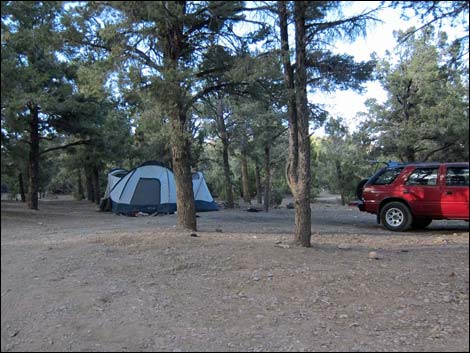 Primitive roadside campsite |
Continuing, at about 1.0 miles out, the road cuts up and right across a very steep slope. When the road is freshly graded, this piece of road is passable in a sedan. However, when the road is worn and washboarded, the bouncing action of the washboards makes it nearly impossible to climb in an 2WD vehicle, and trying to climb the hill pulling trailers and whatnot make it even worse. For RV and trailer campers seeking primitive solitude, there are several options before this hill-climb. Beyond the steep hill, the Macks Canyon Road winds in and out of canyons and around ridges with grand views north across the desert and out onto the Nevada Test Site. At about 1.9 miles out, Macks Canyon Road passes the second, and last, side road, this one again to the left. This side roads heads up a canyon for about 0.76 miles. |
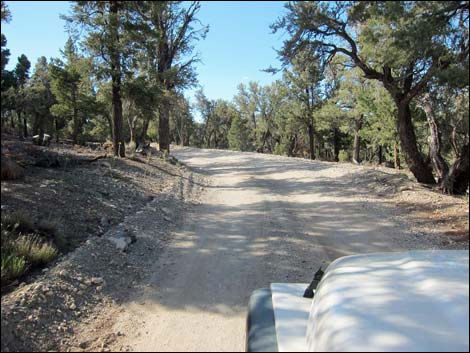 Macks Canyon Road (view N) |
Continuing, the road passes more campsites as it winds in and out of more canyons and crosses more ridgelines. At about 2.72 miles out, the road passes a final ridgeline with parking and a short walk onto a rocky knob with grand views north off across the desert. Beyond that curve, the narrow road winds steeply down into the bottom of Macks Canyon, proper. If the road were muddy, it could be difficult to climb back up this hill in a 2WD vehicle. In the bottom of Macks Canyon, the road runs generally southwest as it crosses and then runs in and out of Macks Canyon Wash. Depending on conditions, this part of the road can be badly washed out. At about 3.26 miles out, the road crosses a green cattle guard in the bottom of the canyon. I don't know how far the fences extend in both directions, but it seems odd up here. |
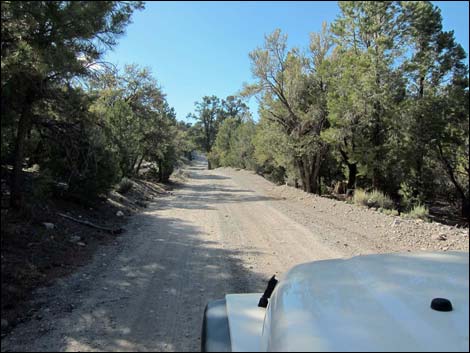 |
Macks Canyon, located on the shady, north-facing side of the mountains, is high and cool and supports a Pine-Fir Forest with tall stands of Ponderosa Pine and White Fir. Other montane plants in the canyon include Wax Current, Rocky Mountain Maple, and even some Blue Elderberry. Heading up the canyon, at about 3.48 miles out, the road passes a sign for Lower Macks Canyon Group Camp (Site 1765). There are no facilities here, and although there are some bare patches of ground to pitch a tent and a few old fire rings, this area isn't very inviting for campers. Continuing up the canyon, at about 3.73 miles out, the road passes a sign for Upper Macks Canyon Group Camp (Site 1766). There are no facilities here, but there are bare patches of ground and many old fire rings, and both sides of the road in this area are much more inviting for campers. |
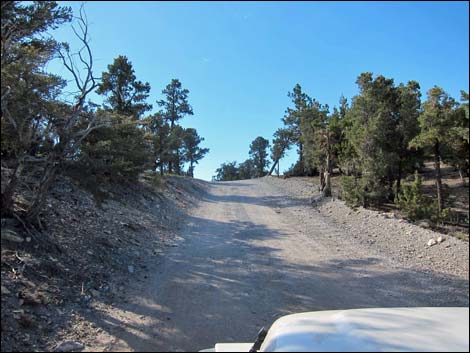 |
In addition to the campsites, off to the left beyond the camp area and surrounded by a post-and-cable fence, Macks Canyon Spring provides a small amount of water that seeps from the hillside and trickles downstream along the base of this hill. The post-and-cable fence keeps feral horses and vehicles out of the spring, and as a result, a dense stand of Scented Shootingstar and Western Columbine grow on moist soil covered with mosses. This is also a good place to see birds such as Western Tanager, Cassin's Finches, and Yellow-rumped Warblers. Golden-mantled Ground Squirrels are common here too, Mule Deer roam the hillsides, and without question, Mountain Lions come down for water at night. |
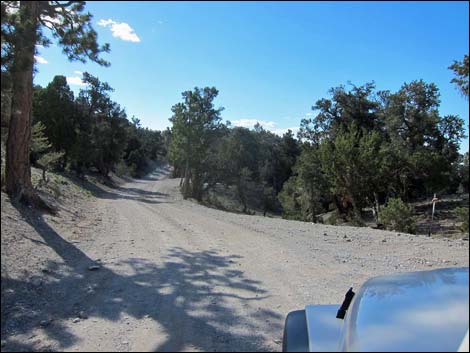 |
From the upper camp area, the road continues up the canyon for another 0.5 miles. In this area, the road deteriorates somewhat, but it still is maintained and there are additional places to camp along the way. The road ends (Site 1767) at a broad turn-about with a few campsites, 4.2 miles out. Boulders and posts block vehicles from traveling farther up the fairly narrow canyon, and shortly beyond the barricades, a sign marks the boundary of Mount Charleston Wilderness Area. Here, at Macks Canyon Trailhead, hikers can continue up the wash to climb Macks Peak or the Sisters peaks, but it isn't the nicest place to camp. Back at the spring, Upper Macks Canyon Group Camp, the campsites are nicer, but technically they are too close to water and hinder wildlife from coming down to drink. |
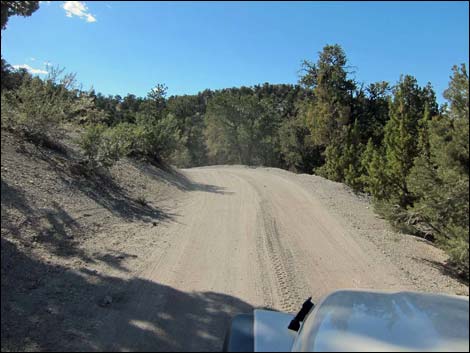 Well maintained road (view NW) |
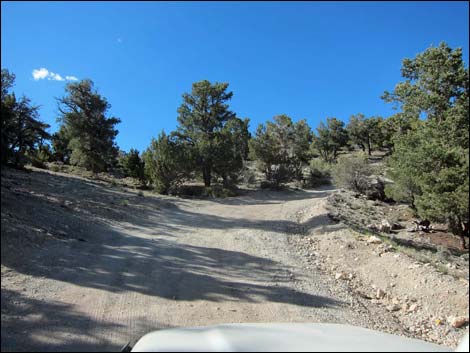 Start of the steep part -- this becomes impassable to 2WD vehicles |
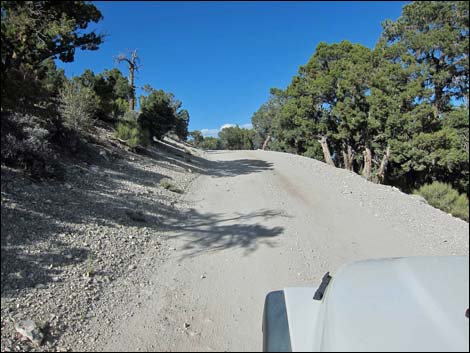 Top of the steep part (view N) |
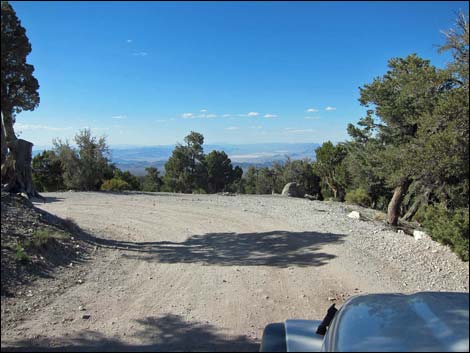 Corner with a view out across the desert (view N) |
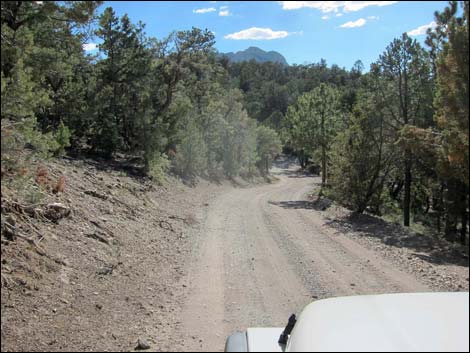 |
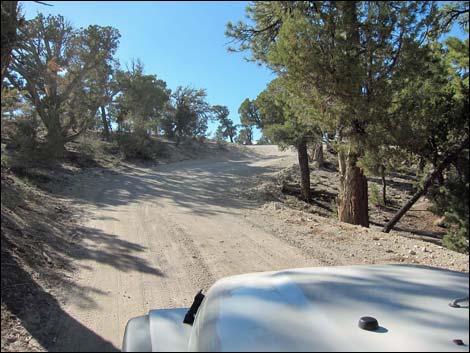 |
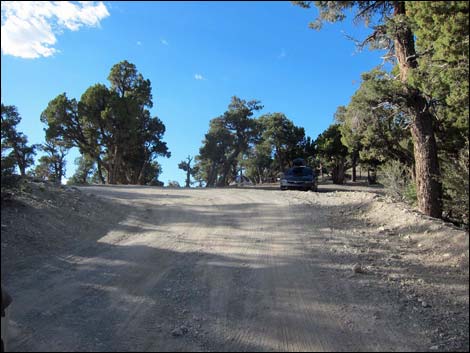 |
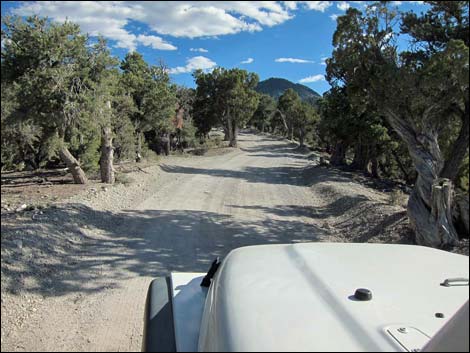 |
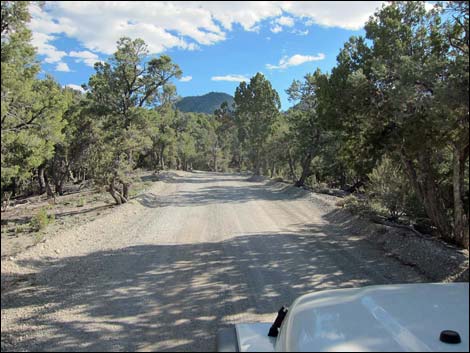 |
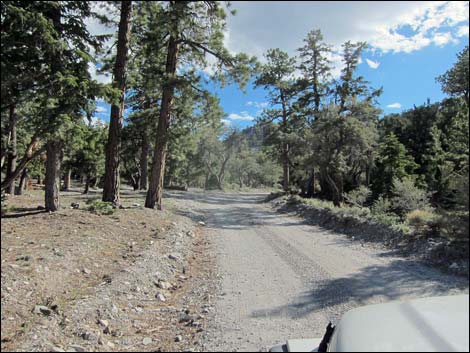 |
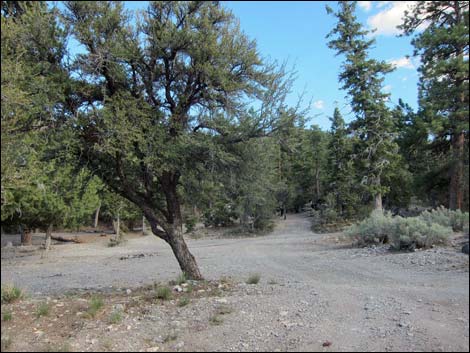 |
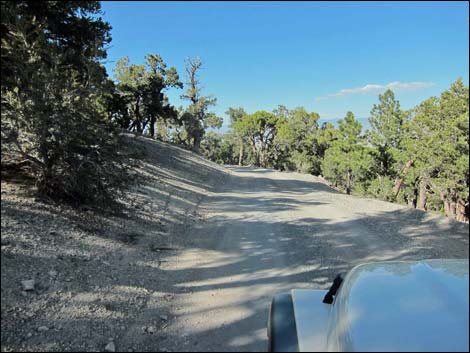 |
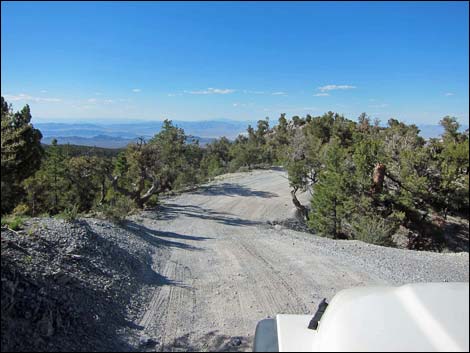 |
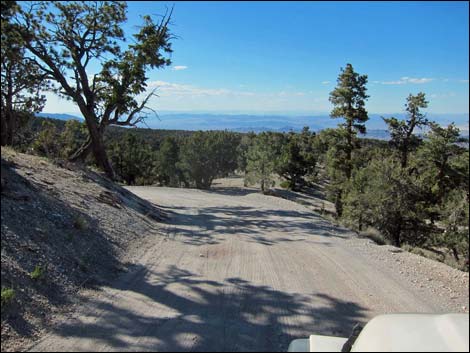 |
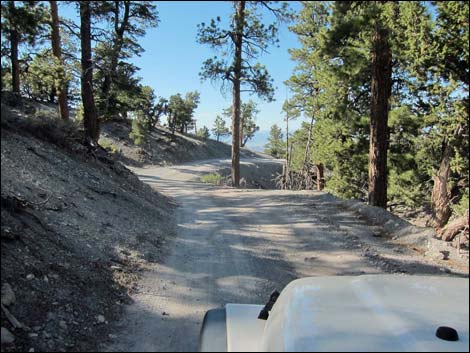 |
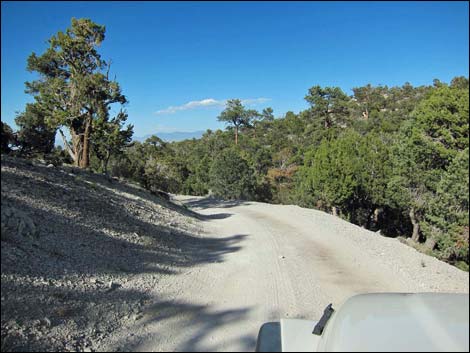 |
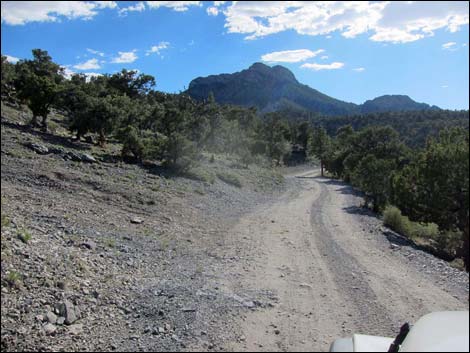 |
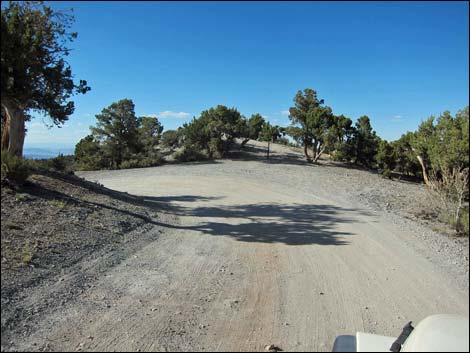 |
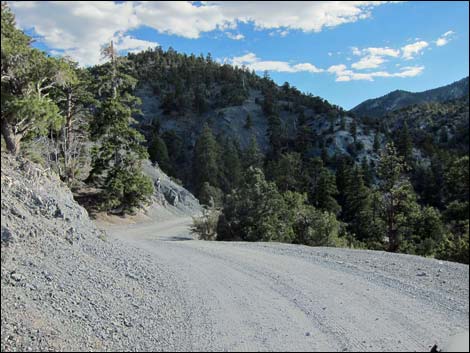 |
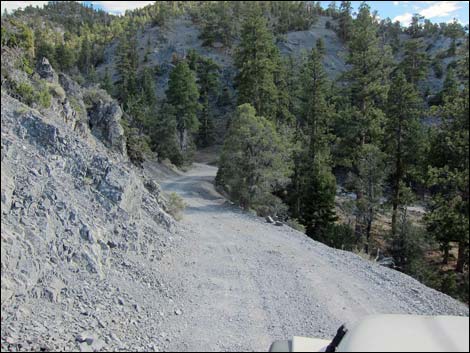 |
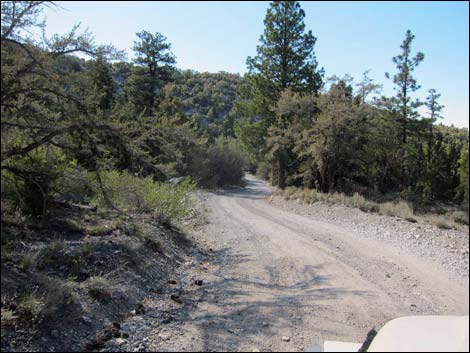 |
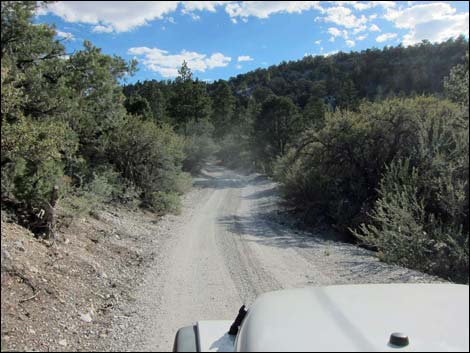 |
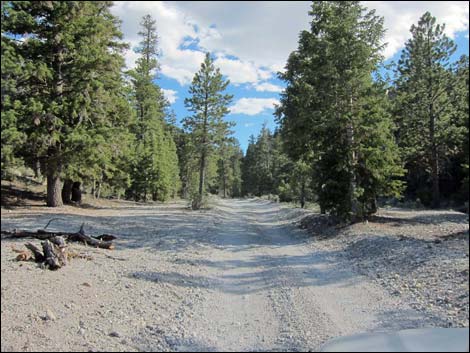 Roadway in the bottom of Macks Canyon (view SW) |
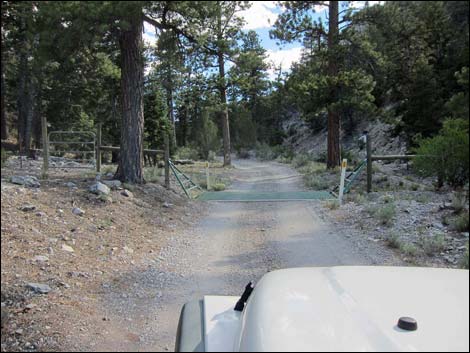 Macks Canyon Road at cattle guard (view SW) |
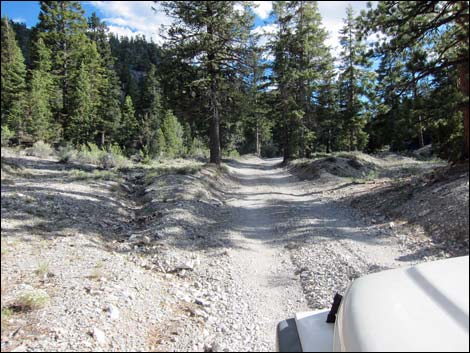 Roadway crossing wash in Macks Canyon (view SW) |
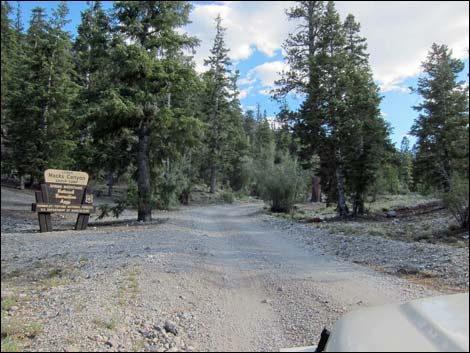 Approaching Lower Macks Canyon Group Camp sign (view SW) |
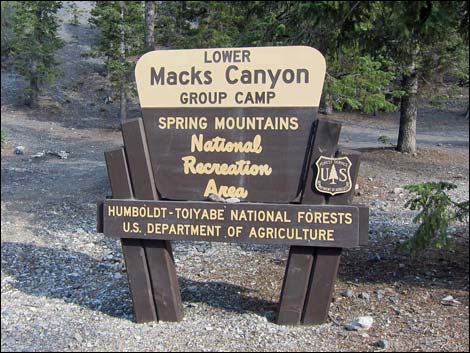 Lower Macks Canyon Group Camp sign (view SW) |
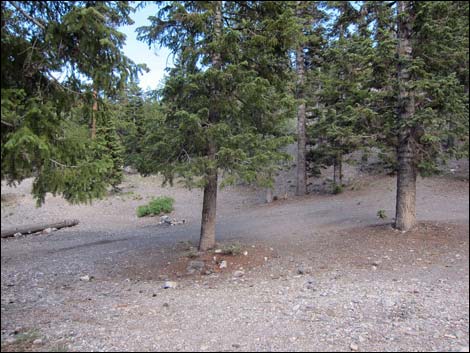 Lower Macks Canyon Group Camp (view E) |
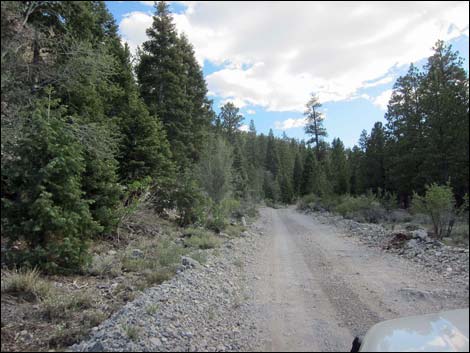 Roadway in Macks Canyon (view SW) |
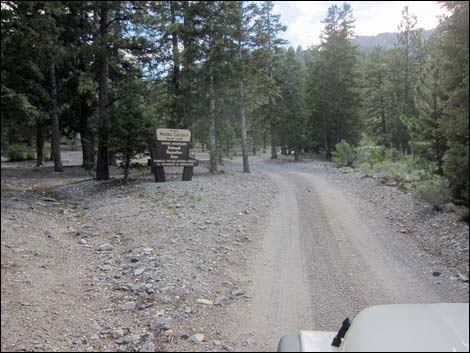 Approaching Upper Macks Canyon Group Camp sign (view SW) |
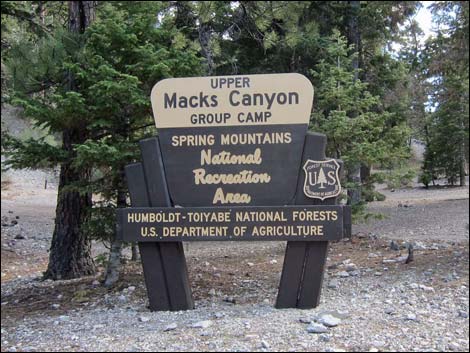 Upper Macks Canyon Group Camp sign (view S) |
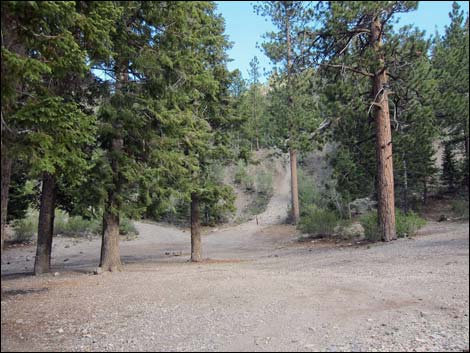 Upper Macks Canyon Group Camp, lower part (view SE) |
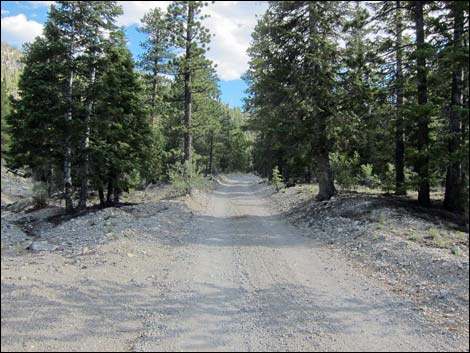 White Fir along the road (view SW) |
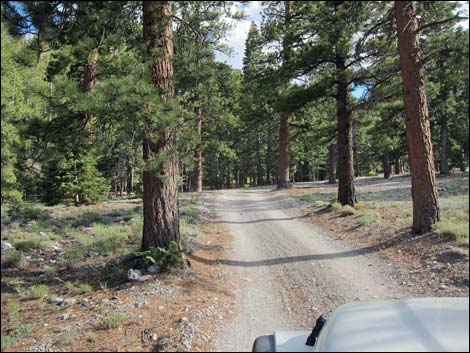 Ponderosa Pine along the road (view SW) |
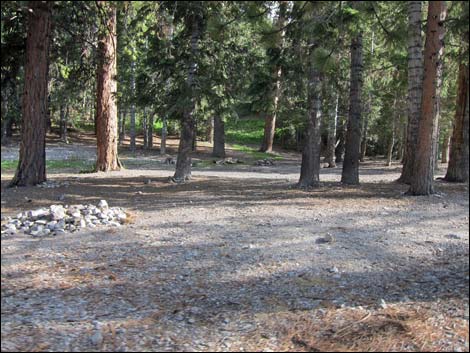 Upper Macks Canyon Group Camp, upper part near spring |
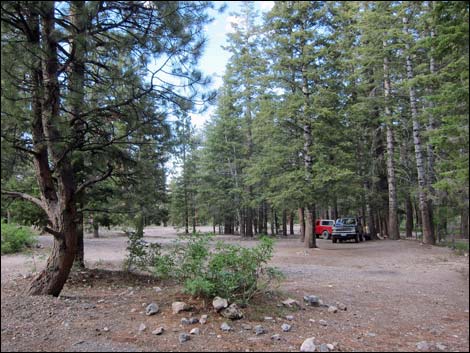 Upper Macks Canyon Group Camp, upper part near spring |
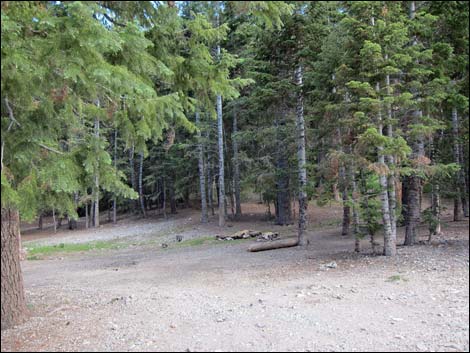 Upper Macks Canyon Group Camp, upper part near spring |
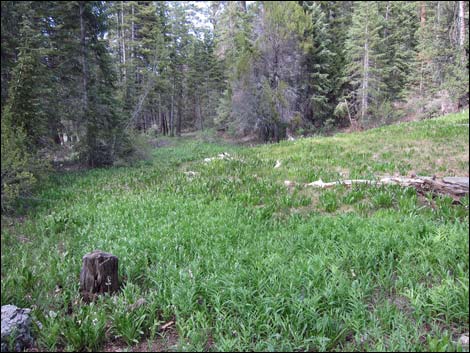 Macks Canyon Spring |
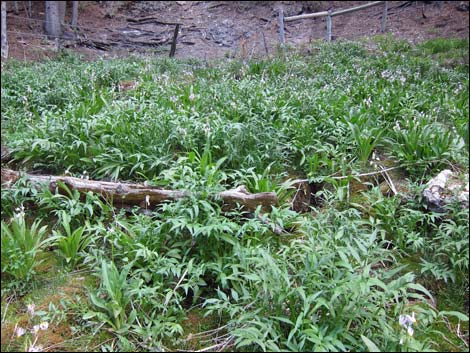 Macks Canyon Spring |
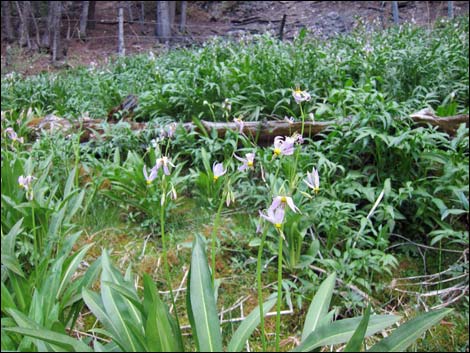 Macks Canyon Spring |
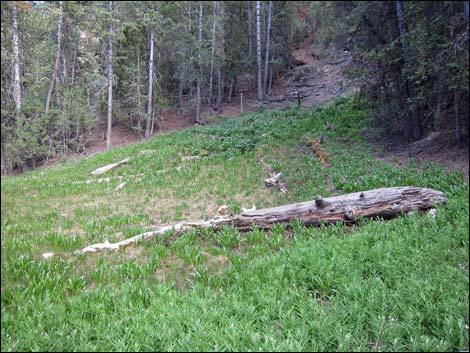 Macks Canyon Spring |
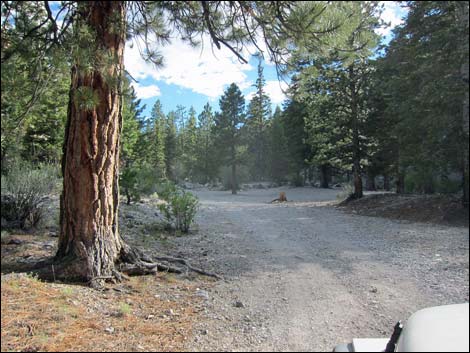 Approaching end of Macks Canyon Road (view SW) |
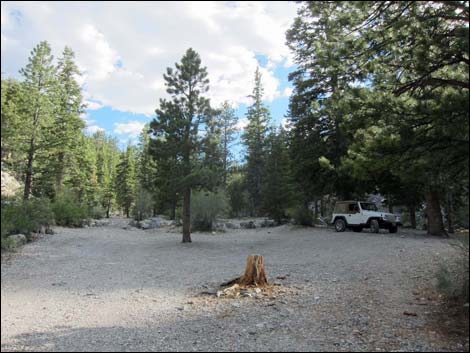 End of Macks Canyon Road (view SW) |
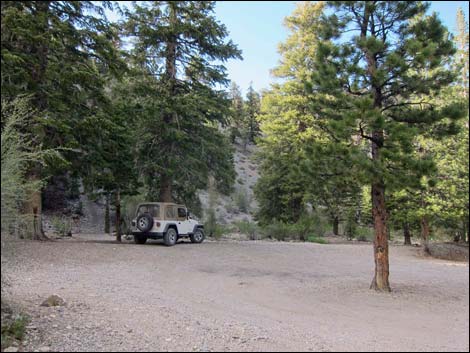 End of Macks Canyon Road (view NW) |
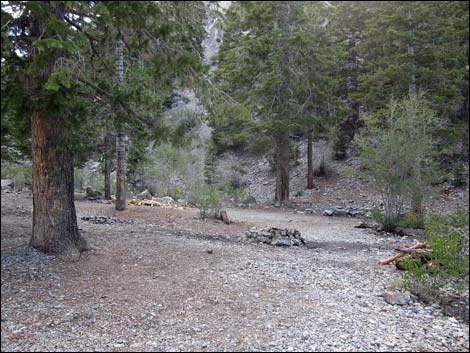 Campsite at end of Macks Canyon Road |
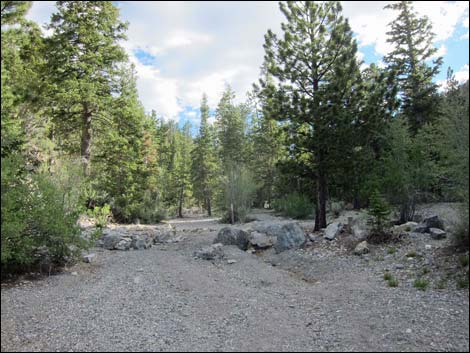 Barricades block Macks Canyon Road (view SW) |
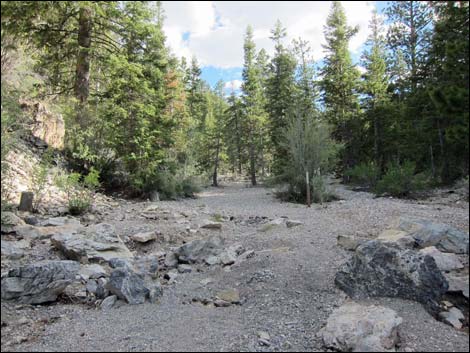 Barricades block Macks Canyon Road (view SW) |
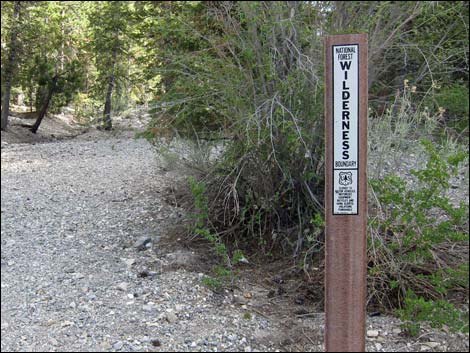 Mt. Charleston Wilderness Area boundary (view SW) |
Table 1. Highway Coordinates based on GPS Data (NAD27; UTM Zone 11S). Download highway GPS waypoints (*.gpx) file.
| Wpt. | Location | UTM Easting | UTM Northing | Elevation (ft) | Point-to-Point Distance (mi) | Cumulative Distance (mi) | Verified |
|---|---|---|---|---|---|---|---|
| 0729 | Lee Canyon Rd at Macks Cyn Rd | 621625 | 4023380 | 7,480 | 0.00 | 0.00 | Yes |
| 1765 | Lower Macks Canyon Camp | 618972 | 4024082 | 7,868 | 3.48 | 3.48 | GPS |
| 1766 | Upper Macks Canyon Camp | 618766 | 4023771 | 7,965 | 0.25 | 3.73 | GPS |
| 1767 | Macks Canyon End | 618321 | 4023277 | 8,157 | 0.47 | 4.20 | GPS |
Happy Hiking! All distances, elevations, and other facts are approximate.
![]() ; Last updated 240329
; Last updated 240329
| Backroads | Hiking Around Las Vegas | Glossary | Copyright, Conditions, Disclaimer | Home |